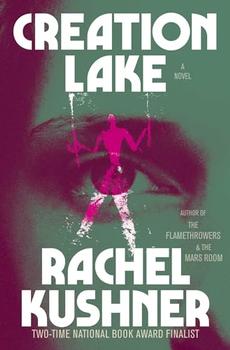Book Club Discussion Questions
In a book club? Subscribe to our Book Club Newsletter!
For supplemental discussion material see our Beyond the Book article, French Philosopher Guy-Ernest Debord and our BookBrowse Review of Creation Lake.
Please be aware that this discussion guide will contain spoilers!
-
Consider the narrative point of view. How does this POV, which at times makes the book read like Sadie's personal journal or even a court testimony, impact the emotional tenor of the book?
-
Think about the life advice Bruno imparts through his aphorisms and maxims, like "when we face our need to control [the future], we are better able to resist that need, and to live in the present" (398), and "Difference dissolves. But you stay you" (401). Discuss your favorite Bruno-isms and theories and analyze their meanings. Do you agree with him that capitalism and the modern organization of life are here to stay? What do you think he means when he says the only solution is to "leave this world"?
-
Sadie indulges in the "bad" behavior of classic male rogue agents. She drinks too much, sleeps with the wrong people, and is highly manipulative. How does that make you judge her?
-
Discuss Sadie's impression of Bruno. What does she admire or loathe about him? How does her view of Bruno shift throughout the book, particularly when she thinks she has found his real identity?
-
Consider the vignette-like structure of this novel. How does this structure contribute to your read of the text and your understanding of Sadie, the Moulinards, and other characters? Do you think the stakes seem heightened, and the flashbacks more vivid, with this tight structure?
-
How do the characters in the book seem to contend with morality, if at all? How does Sadie's morality or lack thereof influence her decisions?
-
Why do you think Kushner provides so little personal history for Sadie?
-
What role does gender play throughout the novel? What differences did you see between the men and the women, the boys and the girls at the commune, and how does Sadie's gender offer her an advantage or disadvantage?
-
Sadie is scathing about the behavior of the Moulinard mothers. She also condemns their leader for demanding adulation and submission, especially from the women. Why is she more judgmental of others than she is of herself?
-
What do you make of Sadie's brittle confidence? Is she a reliable narrator? Can she rely on her own self-image as a woman who doesn't make mistakes? When she says, "I am a better driver after a few drinks, more focused" (27) do you believe her? Do you think she believes herself?
-
Discuss the personal qualities and characteristics of the leaders in the book, like Pascal, Bruno, and even Sadie as a quiet manipulator. Why have these leaders garnered loyal followers? Discuss their charms, attractive traits, and those that repel.
-
Some Moulinards seem to be suspicious of Sadie, and some seemingly accept her into their ranks without reservation. Sadie seems to think of herself as smarter than the Moulinards, but she is outwitted when Burdmoore takes her gun "as a souvenir [that will remind him] of that time some crazy chick came to Le Moulin and tried to stir up a bunch of shit and no one went for it" (388). Do you think none of the Moulinards "went for it" and how do you think this interaction psychologically impacts Sadie?
-
When she leaves Le Moulin, Sadie bans that which can be deemed a "crippling attachment," like the internet, reading the news, watching videos, and drinking alcohol. How beneficial do you think these banishments are? Do you think she will continue living a life of isolation and disaffection?
-
Imagine a future for Sadie. How much longer, and to what extent, do you think she will commit to a decoy life? Discuss possible fates.
Unless otherwise stated, this discussion guide is reprinted with the permission of Scribner.
Any page references refer to a USA edition of the book, usually the trade paperback version, and may vary in other editions.
